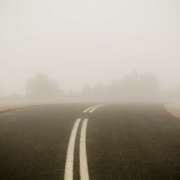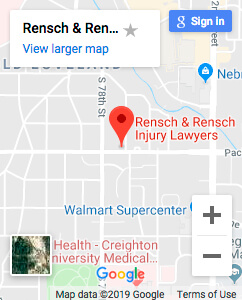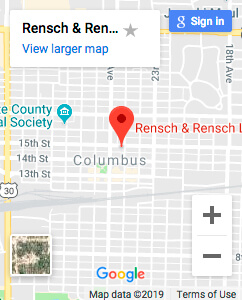4 Tips for Driving in Bad Weather
There are several common causes of car accidents across the United States, and thousands of motorists suffer serious injuries annually because of them. Many of the factors that cause collisions, including speeding, driving under the influence, distracted driving and general recklessness, are within our control, though. One element that causes a significant percentage of serious accidents across the United States that is not within our control is weather.
Bad weather can have a negative impact on driving conditions, and it is one of the most common causes of serious accidents. Regardless of where you reside, there are certain weather patterns that will render the roads unsafe. While you cannot control the weather, you can control how you cope with the conditions.
If you are suffering from injuries sustained in a crash that was not your fault, give Rensch & Rensch Law a call. We can connect you with a respected Omaha personal-injury lawyer who has extensive experience in collisions.
Our attorneys have litigated more than 100 jury trials, and we can investigate the circumstances surrounding your accident to determine if you may have a valid claim. Call us today at 1-800-471-4100 to schedule an appointment.
Here are four tips for staying safe while driving in inclement weather:
- Increase Following Distance
It may seem like common sense, but many drivers fail to increase their following distance during poor weather conditions. According to the AAA, increasing your following distance gives you more time to stop, particularly if the roads are wet or icy.
- Turn Headlights On
Most poor weather also brings with it poor visibility, and if this is the case, turning your headlights on is critical for your safety. Aside from helping you see the roadway in front of you more clearly, turning on your headlights also makes your car more visible to other road users and pedestrians.
- Slow Down
Reduce your speed when the weather turns bad. As AAA mentions, the faster you drive, the longer it will take you to stop. If the road conditions are poor and you need to break for a hazard or slowing traffic, there is a possibility you will not be able to decelerate fast enough.
- Avoid Lane Changes
Try to maintain a predictable driving pattern. Poor weather means you may not be visible to other motorists, and even if they can see you, they may not be able to take evasive action in time.
When possible, make your way to the correct lane and stay there, even if it means driving slower than usual. It is better to drive consistently in poor weather.
Even if you drive carefully, you cannot control the weather nor how other drivers behave. If you sustained injuries in a car crash that was not your fault, call Rensch & Rensch Law today at 1-800-471-4100 to schedule an appointment.
An experienced Omaha personal-injury attorney can look through your case to determine if you may have a valid claim. And if we don’t win, you pay no attorneys’ fees.





I’m glad you mentioned how weather accidents are so common. My sister got hit by a drunk driver in a hurricane. I’ll have to see if there is a lawyer who will defend her case.